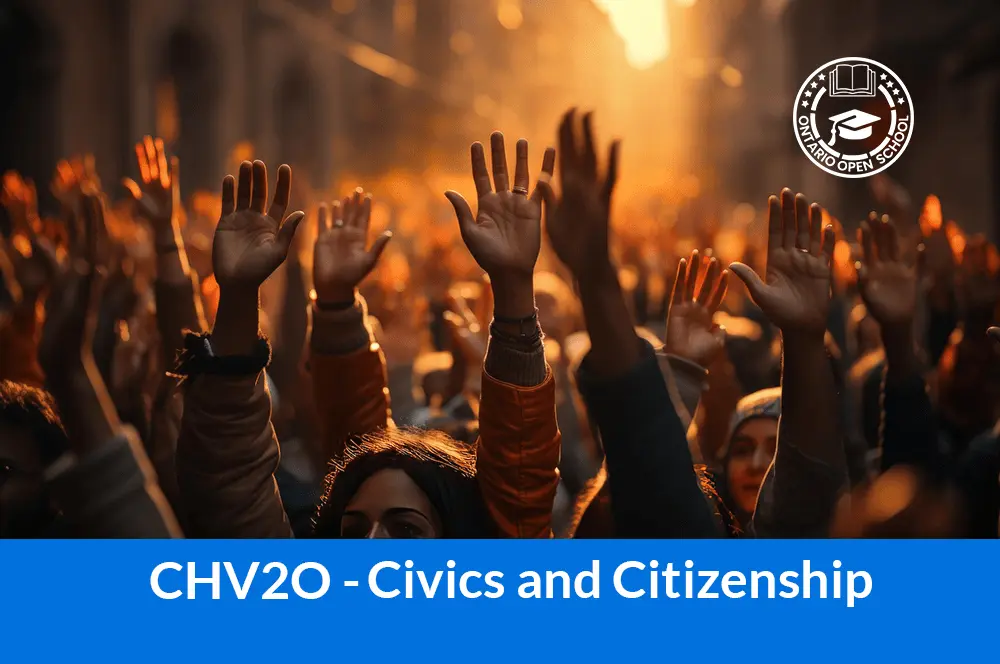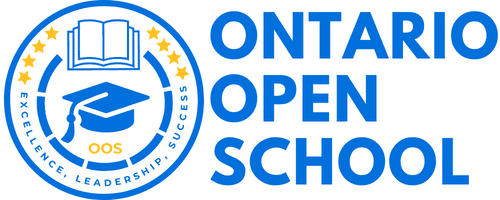- info@ontarioopenschool.com
- 647-494-4499
-
Unit 100 - 29 Gervais Drive, North York, ON.
M3C 1Y9
Copyright 2024 Ontario Open School Inc. All Rights Reserved.
This course explores rights and responsibilities associated with being an active citizen in a democratic society. Students will explore issues of civic importance and the influence of social media, while developing their understanding of the role of civic engagement and of political processes in the local, national, and/or global community. Students will apply the concepts of political thinking and the political inquiry process to investigate, and express informed opinions about, a range of political issues and developments that are both of significance in today’s world and of personal interest to them. This course also includes learning on digital literacy and critical-thinking skills, the mechanisms of government, Indigenous governance systems and structures, the historical foundations of the rights and freedoms we enjoy in Canada, ways in which government policy affects individuals’ lives and the economy, and ways for students to serve their communities.
Unit Order | Unit Name | Suggested Time |
|---|---|---|
| Unit 1 | Civics: Issues and Ideas Civics is the study of how people use politics, laws, words and actions to govern themselves. But what is politics? What are laws? What is government? What do they all have to do with each other? This unit deals with the theory behind civics, defining and describing the origin of government, the different types of law, and the role of people in their creation and maintenance. | 19 hours |
| Unit 2 | Canadian Context With a solid understanding of what laws and governments are, we will next turn to the complex ways in which they are determined in Canada, federal, provincially and municipally. We will consider how things are now and evaluate alternative approaches. We’ll pay special attention to how all Canadians help to make laws and governments work every day. | 21 hours |
| Unit 3 | Global Context Canada is one country among many on the planet, and so Canadian attitudes and responses to the world speak loudly about Canada’s identity and values. In this final unit, we’ll consider some of Canada’s responses to challenges and changes around the globe. We’ll evaluate Canada’s participation in a number of international organizations. Finally, we’ll analyse what it means to be a global citizen in today’s world. | 13 hours |
| Final Evaluation 30% | Final Exam | 2 hours |
| Total | 55 Hours |
A wide variety of instructional strategies are used to provide learning opportunities to accommodate a variety of learning styles, interests and ability levels. These strategies include, but are not limited to:
| Course Specific | Language | Collaborative |
|
Direct teaching Teaching notes Work and tasks sheets Homework Independent reading Independent study Problem solving Information Analysis Research Portfolio Reflection Presentation Decision making Group Assignments Brainstorming Diagrams Problem-based learning Peer-evaluation Self-evaluation |
Oral presentation
Class Discussion Small group discussion Teacher-student conferencing Peer-evaluation Personal response notes Reading and answering questions Socratic Dialogue |
Cooperative learning Peer-evaluation Brainstorming Group discussion Student-teacher conferencing |
Purpose
The primary purpose of assessment is to improve student learning. Assessment relates directly to the expectations for the course.
A variety of assessments for and as learning are conducted on a regular basis to allow ample opportunities for students to improve and ultimately demonstrate their full range of learning and for the teacher to gather information to provide feedback. Assessment tasks relate to the success criteria set out in lesson plans. Success criteria allow students to see what quality looks like.
Evaluation is the process of judging the quality of student work in relation to the achievement chart categories and criteria and assigning a percentage grade to represent that quality. Evaluation is based on gathering evidence of student achievement through:
Assessment for Learning – we provide feedback and coaching. Assessment FOR Learning is the process of seeking and interpreting evidence for the use of learners and their teachers to decide where the learners are in their learning, where they need to go, and how best to go there.
Assessment as Learning – we help students monitor progress, set goals, reflect on their learning
Assessment AS Learning is the process of the explicit fostering of students’ capacity over time to be their own best assessors, but teachers need to start by presenting and modeling external, structured opportunities for students to assess themselves.
Assessment of Learning – we use assessments to provide evaluative statements about student achievement. Assessment OF Learning is the assessment that becomes public and results in statements of symbols
(marks/grades/levels of achievement) about how well students are learning. It often contributes to pivotal decisions that will affect students’ future.
ASSESSMENT TOOLS
Strategies for Assessment and Evaluation of Student Performance
| 70% | Units | Duration | Overall Expectation | AFL | AAL | AOL | Assessed Categories | |||
| K
25% |
I
25% |
C
25% |
A 25% |
|||||||
| A | 20 hours | A1 – A2 | Discussion
Worksheet |
Discussion Questions
|
The River Comprehension and Application Paper | x | x | x | x | |
| B | 20 hours | B 1- B3 | Homework
Discussion
|
Self-Assessment | The Power of One – Making Connections Questions
Applying ideological Models |
x | x | x | x | |
| C | 15 hours | C 1- C3 | Discussion | Student-Teacher Discussion Forum
|
Application- Human Rights Law
Fact Sheet
|
x | x | x | x | |
| 30% | Final Exam | A1-C3 | Final Exam | x | x | x | x | |||
Resources
Growing Success: Assessment, Evaluation and Reporting in Ontario Schools (2010)
http://www.edu.gov.on.ca/eng/policyfunding/growSuccess.pdf
The Ontario Curriculum Grades 9 and 10 2013 Canadian and World Studies GEOGRAPHY • HISTORY • CIVICS (POLITICS)
http://www.edu.gov.on.ca/eng/curriculum/secondary/canworld910curr2013.pdf
The River Simulation
http://schools.yrdsb.ca/markville.ss/history/civics/unit%201/The%20River%20Simulation.pdf
The Power of One
https://www.youtube.com/watch?v=ObhieXt_uHs
How the Canadian Government Works
https://www.youtube.com/watch?v=nTLaQua1LiQ
What’s your political party?
https://canada.isidewith.com/political-quiz
Political Parties in Canada
https://www.youtube.com/watch?v=nhaq5nWYUa0
Universal Declaration of Human Rights
Grading
Weighting of categories
| Knowledge/Understanding | Thinking/Inquiry | Communication | Application |
| 25% | 25% | 25% | 25% |

Course Grade | Grade 10 |
|---|---|
Course Code | CHV2O |
Course Category | Canadian and World Studies |
Course Type | Open |
Course Delivery | Online |
Course Duration | 8hrs |
Course Credit | 0 |
Copyright 2024 Ontario Open School Inc. All Rights Reserved.
